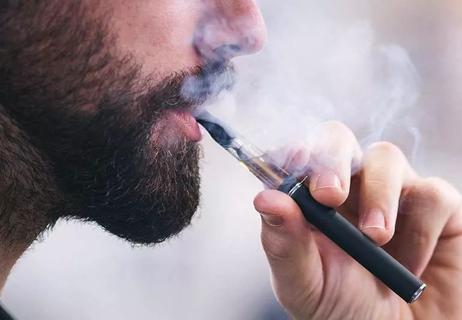Nicotine replacement products and relaxation techniques can help you ditch the dip

When it comes to tobacco, smokeless doesn’t mean harmless. Dipping tobacco, also known as snuff or chew, is highly addictive and comes with many of the same health risks as smoking cigarettes.
Advertisement
Cleveland Clinic is a non-profit academic medical center. Advertising on our site helps support our mission. We do not endorse non-Cleveland Clinic products or services. Policy
Like quitting cigarettes, quitting dip can be very difficult. But once you do, the health benefits are huge. Pulmonologist Humberto Choi, MD, explains what to expect when you give up snuff — and how you can do it, one day at a time.
There’s no way around it: Nicotine dependence can be an incredibly tough habit to kick. And dipping tobacco actually has more nicotine than cigarettes, so it can be even more addictive — and thus, harder to quit.
Dr. Choi shares some tips to help you quit dipping.
“The chemical dependence from smokeless tobacco is the same as with cigarette smoking, so we use the same nicotine replacement tools to help people quit,” Dr. Choi explains.
Nicotine replacements help you quit smoking by reducing your cravings for nicotine. There are a variety of types:
Advertisement
What works for one person won’t necessarily be right for another, so team with a healthcare provider to figure out which method will set you up for success.
But Dr. Choi notes that not all providers are willing to prescribe nicotine replacements to help with quitting. “If your doctor isn’t comfortable with them, ask if they can refer you to someone else who is.”
Dipping has probably become such an ingrained part of your daily life that when you try to quit, you’ll realize there are reminders of your habit everywhere — from the spit cups you’ve stashed all over the house to hanging out with friends who are still in the habit.
“If everything you do revolves around using tobacco products, a lot of things can trigger your cravings,” Dr. Choi notes. “Most people need to create entirely new habits and rearrange some aspects of their lives when they’re trying to quit.”
In the long run, giving up nicotine will dial down your anxiety and jitters — but when you’re first trying to quit, you may initially feel amped up, especially if you were turning to dip to manage stress.
Certain relaxation techniques can help boost your body’s parasympathetic response, which moves you out of fight-or-flight mode and into rest-and-digest mode. Strategies include:
When you’re trying to quit, be extra kind to yourself. Focus on stress management and self-care to set yourself up for success.
Whether you quit cold turkey or taper off slowly, you’re likely to experience symptoms of nicotine withdrawal, which can be really unpleasant and uncomfortable.
“The nicotine in dip is very addictive,” Dr. Choi warns. “For people who are trying to quit, it comes with many of the same withdrawal symptoms as quitting cigarettes.” When you’re trying to quit dipping, you may experience:
The good news? These side effects won’t last forever — and you don’t have to soldier through them alone. “Your healthcare provider can help treat your withdrawal symptoms and help you through the process of quitting,” Dr. Choi says.
It can be hard to ask for help — but there’s no shame in it, especially when it comes to addiction.
“There can be a lot of guilt related to the use of tobacco products, and it’s common for people to feel ashamed when they come into my office,” Dr. Choi says. “You may not want to tell the full story in the beginning, but it’s very healthy to talk about it.”
Advertisement
Your doctor or other healthcare provider can talk to you about medications and strategies that can help you manage your withdrawal symptoms and ultimately quit dipping for good.
When you’re trying to make a major change in your life, especially one related to chemical dependence, it’s important to surround yourself with people who can cheer you on and hold you accountable.
In addition to telling your friends and family that you’re trying to quit, talk to your healthcare provider about a tobacco cessation program or look into online services. If you live in the United States, call 1.800.QUIT.NOW (1.800.784.8669) for support, coaching and information about local resources, including support groups.
“Dipping is often promoted as being safer than smoking cigarettes because it isn’t associated with the development of lung cancer,” Dr. Choi says, “but there are many other risks.”
When you quit dipping, you’ll reap all kinds of health benefits. Here are three major reasons to put an end to your dipping habit once and for all.
Think smokeless tobacco can’t possibly contain enough nicotine to do much harm? Think again. “Nicotine is a stimulant,” Dr. Choi explains, “and sometimes, dip even contains a higher concentration of nicotine than cigarettes.”
Advertisement
The nicotine in smokeless tobacco (and cigarettes) is associated with all kinds of heart-related conditions. It can:
“Some of the biggest long-term benefits of quitting smokeless tobacco are related to cardiovascular disease,” Dr. Choi clarifies, “and you’ll also notice more immediate effects, like lower heart rate and blood pressure and less anxiety.”
Smokeless tobacco isn’t associated with lung cancer the way cigarettes and cigars are. But it comes with serious cancer risks of its own.
In addition to the harmful effects of tobacco and nicotine, smokeless tobacco also contains up to 30 toxic chemicals, including lead, formaldehyde and arsenic, that have been linked to various types of cancer. They include:
“One of the long-term benefits of quitting dipping is that you significantly lower your risk of developing these types of cancer,” Dr. Choi states.
Ditching dip eliminates the biggest risk factor for mouth cancer, but that’s not the only way your mouth will benefit.
Advertisement
“Smokeless tobacco can change the lining of your mouth and cause thick, white patches,” Dr. Choi says. This condition is known as leukoplakia, and it sometimes appears along with red lesions known as erthyoplakia. Both types of mouth ulcers can turn into cancer.
Dipping can also cause:
And don’t forget about your teeth! When you’re done with dip, your pearly whites will look a lot more ... well, pearly. Yellow teeth and tooth decay are common effects of using smokeless tobacco; it can even lead to tooth loss.
“Soon after you quit dipping, you’ll start to notice your sense of taste and even your sense of smell coming back,” Dr. Choi says.
Depending on where you live and how much smokeless tobacco you use, a can of it can run anywhere from $3 to $10. Dropping the habit can put hundreds or even thousands of dollars a year back into your pockets!
You’ll also finally break free of all those lectures from the dentist, doctor, family or friends — and most importantly, you can feel good about doing something positive for your health.
“There are so many good reasons to quit,” Dr. Choi reinforces. “It can be very difficult to do, but the benefits are many.”

Sign up for our Health Essentials emails for expert guidance on nutrition, fitness, sleep, skin care and more.
Learn more about our editorial process.
Advertisement

When it comes to tobacco use, there is no such thing as ‘safe’

They don’t contain tobacco, but these toxic, highly addictive products can permanently damage your health

Each comes with substantial health risks and should be avoided

Certain supplements, like licorice root and St. John’s wort, can raise your blood pressure or negatively interact with medication

No, but it momentarily slows down during this involuntary body function

Daily oral hygiene goes a long way to keeping your mouth healthy and your smile bright

Most kids start losing baby teeth around age 6 — but there’s some wiggle room in the timeline

Spoiler alert: Taste buds change more often than you might think

Even small moments of time outdoors can help reduce stress, boost mood and restore a sense of calm

A correct prescription helps your eyes see clearly — but as natural changes occur, you may need stronger or different eyeglasses

Both are medical emergencies, but they are very distinct events with different causes